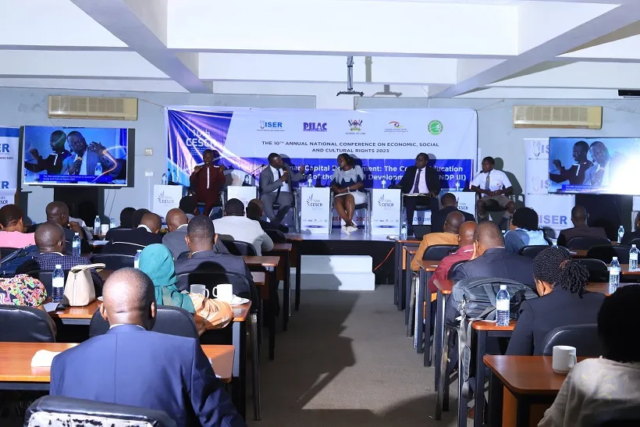
Experts have noted that one cannot thrive and enjoy their humanness if they are not enjoying the full spectrum of human rights that engulfs education.
They say that although its realization falls on several players, the government shouldn’t sit back and let third parties exploit parents without any regulation.
These made an alarm during the 10th annual conference on Economic, Social and Cultural Rights whose focus was on the cost of Education in Uganda on Thursday.
This year’s theme was: “Human Capital Development: The Cost of Education in The Era of the Third National Development Plan”
Ms Angella Kasule, Executive Director – Initiative for Social & Economic Rights, ISER noted that the money that the government has been sending to schools in the form of capitation grants has been grossly insufficient which triggers the schools to ask for more money from the parents.
But also, she believes that there is a lot of mismanagement in government schools.
“Why is it that a government-aided school that is receiving state funds, having teachers on the government payroll, has the infrastructure in place, and also benefiting from the loans that we are acquiring, asks millions in tuition fees?”
“I think the government has to put their house in order,” she noted.
“…the system has been so demonized to a level that a 10-year-old and 11-year-old understands now for me to go to a public school I’m being condemned. I have an 11-year-old daughter, I found her at home on Wednesday and she was chatting with friends and they were so depressed, I asked what is it they said “Kenneth is not coming back to school because the parents are taking him to a government school”. An 11-year-old is understanding that our public system is dead.”
Ms. Kasule also challenged the government to stop the habit of exonerating some people from paying taxes that would have been used for the development.
“We know where the money comes from – the taxes that we pay. We are all Ugandans we know there are people in this country who do not pay taxes. The people that are given waivers for 10 years, 20 years. They have never paid taxes – this is where the money should come from.”
Makerere University Vice Chancellor, Prof Barnabas Nawangwe noted that education is the only platform that provides not only equity but also helps to fight dangerous vices like domestic violence.
Representing him, Prof. Christopher Mbazira noted that in their time, they were paying only 650 shillings per annum in government school which he says was relatively affordable for most parents, unlike today.
According to him, quite a number of parents today may not afford those high fees and at times, schools hike fees unnecessarily, and there’s a lot of duplication.
He gave an example of South Korea whose geographical size is smaller to that of Uganda but also has fewer natural resources compared to Uganda but is much more developed.
“What they [Korea] have done, they have educated their people and that is the biggest asset that they have. So you can see at the time of independence we were on the same leaf in terms of GDP per capita. But now, if you want to see the GDP of South Korea from Uganda, you have to stand on mountain Rwenzori.”
“Therefore, we need to change the way we do things.”
Mr. Moses Musingo, Assistant Commissioner, Secondary Education, Ministry of Education noted that for the ministry to provide quality education, there is a need to increase the budget about tenfold.
However, he indicated that this can be raised in two ways – increasing the fees and or increasing the taxes and whichever way, the citizens are the ones to clear.
The other debate by the government, he said, is “should we provide all education for some or some education for all?”
In his keynote address, Dr Joseph Muvawala – the Executive Director National Planning Authority underscored the essence of well-educated, skilled and human resources to facilitate the country’s socio-economic transformation since the availability of appropriate and adequate human capital facilitates an increase in production, productivity and technological growth.
He noted that Human Capital Development has featured prominently as a key fundamental that must be strengthened to harness the opportunities in the NDP era.
“Consistent investment in human capital is essential for Uganda to achieve its development goals and improve the overall well-being of its citizens. Uganda’s human resource development strategy is anchored on the premise of maximizing the benefits of the demographic dividend. The NDP era has prioritized human resources development in areas of education, skills development, health, water and sanitation among others.”
He noted that the discussion of the cost of education comes at an important time, especially when the country is at a crossroads, for financing education because of the trade-off of financing the different levels of education.
“Human capital theory suggests that individuals invest in education to enhance their knowledge, skills, and abilities, which leads to higher productivity and increased earning potential,” he said.
He discussed that in regard to the political economy theory, it implies that for education to be adequately funded, the economic system must be able to generate enough revenue and the political system must make education its priority.
“In terms of implication of the Public Goods Theory; since education is a merit good with both private and public benefits, it cannot entirely be provided and financed by the government through tax pay but instead also include private contributions.”
Muvawala called for equality of educational opportunity irrespective of religion, tribe, gender and location as well as provision of conditions for success so as to minimize exploitation of the weak.






